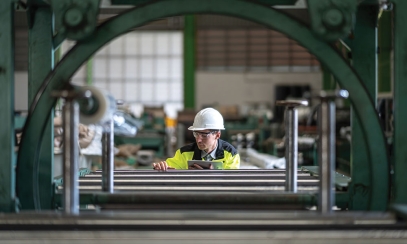Free Will? Or is Life Predetermined?
If God has a plan, what does it matter what I do? Are we really free or is life predetermined?
Father Schoenstene: The plan is salvation. That’s our destiny; that’s what we’re made for. The problem is getting there. To exercise our freedom, we can choose or reject all kinds of things – stations in life, for example. I was told by the Adrian Dominican sisters in grammar school that God probably has a number of different vocations he is offering you, a thought rooted in Thomas Aquinas’ writings. Thomas says that God knows what can occur in the future because there are a number of possibilities. For a Catholic, life is not predetermined; John Calvin would disagree. He opts for God’s omnipotence over free will. According to him, we are determined, even to the point of salvation and damnation. The church rejects that. The Catholic view is a little messier. Somehow, God’s plan works out and yet somehow, we’re free. What’s nice about this is that modern science has shown there is all kind of randomness, so in a sense the whole universe has this freedom built into it – we’re sort of the symptoms of creation. Yet, somehow it all works. At least most of the time. So, does it matter what you do? Yes, it does – for your happiness and for other people’s. The choices we make do matter – they determine what we’re going to do with our own lives and others. This also includes moral matters; sin is an offense against God’s creation – it breaks the world in a little way. It’s not supposed to be – we have the freedom to do it, but it’s not what God wants. That’s the biblical notion of it – sin harms creation
Father Stevens: Aquinas dealt with this problem as well. He said that if God knows what we need, and what he will accomplish ahead of time, then what’s the purpose of prayer? Doesn’t that render prayer futile? Aquinas’ answer is ingenious and is the most satisfactory – God has a plan that will eventually be accomplished. And God has willed that some things will come about because of our prayers. God works through our freedom; God works through our prayers to effect his providential plan. Aquinas says that this raises us to the dignity of being co-creators with God – we get to join in God’s causality. We’re talking about God’s freedom – not our freedom. We’re not talking about two free subjects in competition with each other – God is freedom. God is the font of freedom and our freedom comes from God – God effects his providential design through our freedom. The perfect example is the Feast of the Immaculate Conception – would we say Mary’s “yes” at the Annunciation is a set-up because she is free of original sin? That’s not the case at all – grace empowers our freedom to give the kind of response Mary gives. This is what distinguishes us from double predestination, from high Calvinism and things of that sort – it’s not either human freedom or divine freedom. It’s that by abiding in God we find our freedom.
Are you a heretic?
What do you believe about Catholic dogma and doctrine? Do you believe:
a. they give us knowledge of God and the supernatural?
b. they can change over time to meet people’s religious needs?
If you answered “b”, you may want to do some reading on the modernist heresy, which was denounced by Pope Pius X. In this heresy, our only knowledge of God is found in subjective religious experiences, which are binding only on the person having them. Principal proponents of the modernist movement were Father Alfred Loisy and Father George Tyrell.
Symbols:
Trefoil
The trefoil is generally formed of three interlinked circles, sometimes encompassing a triangle. It is often thought to be a representational version of the shamrock, St. Patrick’s famous teaching tool for the nature of the Trinity.
Who is that philosopher?
Prior to studying theology, seminarians study philosophy, which is defined as “the love of wisdom.” Many great theologians have thoughts rooted in pre-Christian or other philosophers, and we are going to profile some of them in this series.
Abelard
Who was he? Peter Abelard was born in Pallet, Brittany, to the village lord, Berengar and his wife, Lucia. The oldes child, Peter was supposed to go into the military, but opted for a life of learning instead.
What did he do? Abelard went to Paris to study with William of Champeaux at Notre Dame, but soon found himself in profound disagreement with his mentor and set up his own school.
What is he best known for? Abelard’s romance with Heloise, the niece of the canon of Notre Dame, has become the stuff of song and story. Heloise bore a son out of wedlock and Abelard, concerned that her uncle was mistreating her, sent her to a convent. Heloise’s uncle thought Abelard was going to abandon her, so sent men to attack and emasculate Abelard. Abelard became a monk and Heloise the abbess of a convent. Abelard was a theological Platonist and a celebrated teacher, whose students included John of Salisbury and Arnold of Brescia.
How did he die? Abelard was condemned by the Council of Sens in 1140 at the instigation of St. Bernard of Clairvaux. He submitted and retired to Cluny where he died in 1142. He and Heloise were buried together.
Where in the world?
Sometimes this land’s name is used simultaneously with its ancient neighbor’s, Israel. But this land was the Southern Kingdom for descendants of Jacob, and it is named for one of his sons. It became a nation after the death of Saul, when its residents wanted a king and named David for the job. This kingdom remained intact long after Israel fell to the Assyrians. What is it?
Judah



